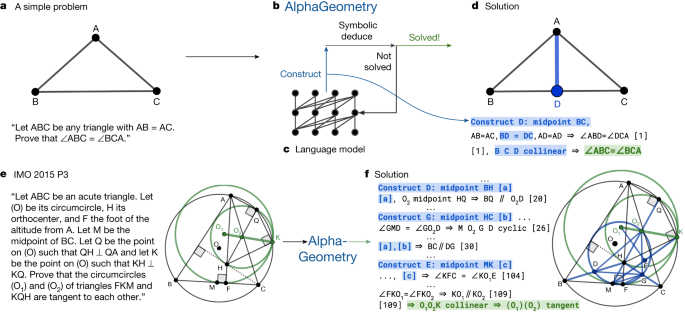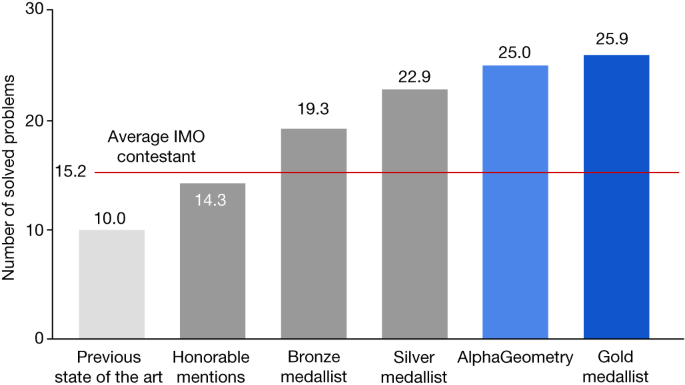Google DeepMind has recently unveiled a groundbreaking AI system named AlphaGeometry, aka AGI, that is capable of solving complex geometry problems. This advanced AI system, designed to tackle Olympiad-level geometry problems, has achieved a performance level comparable to that of an International Mathematical Olympiad (IMO) gold medalist. This is a significant milestone in artificial intelligence, especially considering the system was trained without human demonstrations.
AlphaGeometry is a neuro-symbolic system that combines a neural language model with a symbolic deduction engine. The neural model, trained from scratch on a large-scale synthetic data set, guides the symbolic engine through infinite branching points in challenging problems. This approach allows AlphaGeometry to sidestep the need for human demonstrations by synthesizing millions of theorems and proofs across different complexity levels.

Traditionally, AI systems have struggled with complex problems in geometry and mathematics due to limitations in reasoning skills and a lack of quality training data. The DeepMind team, however, has successfully addressed these challenges. They combined a neural language model, known for its predictive power, with a rule-bound deduction engine. This combination allows the system to ask the neural language model for suggestions when it encounters a difficult problem, enabling the two components to work together to find solutions.
Mathematical theorem proving, especially at the Olympiad level, is a testament to the mastery of logical reasoning and searching through an infinitely large space of actions toward a target. It’s a skill highly regarded since the first Mathematical Olympiads in 1959, designed to identify exceptional talents in problem-solving. Proving theorems in geometry has been particularly challenging due to unique translation challenges and a severe scarcity of training data.
The team generated over 100 million synthetic theorems and proofs, many exceeding 200 steps, a length four times longer than the average Olympiad theorem proof. This was a key innovation, as it enabled the system to learn from a wide range of problems and solutions without relying on scarce human-provided proof examples.
In a test with 30 latest Olympiad-level problems, AlphaGeometry solved 25, a performance nearing that of an average IMO gold medalist and substantially outperforming previous AI methods. Notably, it produces human-readable proofs and even discovered a generalized version of a translated IMO theorem from 2004.

The researchers, in their Nature publication, described the model as “a breakthrough in AI performance.” They attributed this advancement to overcoming AI systems’ traditional struggles in complex geometry and mathematics, primarily caused by deficiencies in reasoning capabilities and the availability of adequate training data.
The success of AlphaGeometry in geometry theorem proving has broader implications for other mathematical domains facing similar challenges of data scarcity. Its ability to generate and train on purely synthetic data provides a general framework that could be adapted to other areas of mathematics.
The secret to AlphaGeometry’s success lies in its neuro-symbolic system. The neural language models are adept at quickly identifying patterns and relationships in data but often struggle to explain their decisions robustly. On the other hand, symbolic deduction engines use clear rules based on formal logic to reach conclusions but can be slow and inflexible. AlphaGeometry’s language model guides its symbolic deduction engine towards likely solutions, especially useful in Olympiad geometry problems that often require adding new geometric constructs to diagrams.
In a move that is particularly exciting for developers and researchers, AlphaGeometry’s code and model are open-source and available for commercial use under an Apache 2.0 license on GitHub. This accessibility offers great potential for further exploration and application in various fields.
Thang Luong, a co-author of the study, posted on X (formerly twitter, still is) highlighted the importance of this development in the path towards more advanced and general AI systems. He believes that advanced reasoning is a key prerequisite for achieving Artificial General Intelligence (AGI).
AlphaGeometry is more than just an AI system; it represents a leap forward in AI’s ability to engage in deep mathematical reasoning. The development challenges our perceptions of AI’s capabilities and opens up new possibilities for its application in educational, academic, and commercial settings. It’s a fascinating time in the field of artificial intelligence, and AlphaGeometry is undoubtedly a development to keep an eye on.
Subscribe to our email newsletter to get the latest posts delivered right to your email.


Comments